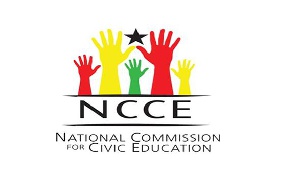The National Commission for Civic Education (NCCE) has appealed to political parties and supporters to avoid tribal-based campaigns in the upcoming general elections because they are a threat to national unity.
The NCCE has therefore encouraged all political parties and their supporters to consider themselves first as one people and as Ghanaians belonging to one nation called Ghana above all other considerations.
“The practice whereby some political actors would say because he is from this place and the other one is also from that place, holding on with the intention of encouraging the people to vote on ethnic lines, is by itself dangerous and a threat to national unity and interrelations among the people and could destroy the democratic credentials of the country”, the NCCE noted.
Madam Kathleen Addy, the Chairperson of the NCCE raised these concerns at the fourth series of stakeholders’ dialogues that form part of the NCCE “Preventing and Containing Violent Extremism (PCVE) Project held in Wa to examine some aspects of PCVE, especially during the upcoming elections in Ghana.
“I am the one that they should vote for or I must be considered as a natural ally because I come from where you come from and because the other one is not coming from where you come from should not be voted for; these divisional tendencies are unacceptable and not good for Ghana’s democracy and must be dealt with once and for all to sustain peace and stability for the country”, the NCCE Chairperson pointed out.
Madam Addy also raised concern about religious intolerance, which was progressing and taking shape in Ghana’s political cycles in recent years and urged political parties to take a critical look at its emergence and nip it in the bud because identifying and voting on religious affiliations and considerations would not augur well for Ghana’s democratic dispensation.
“Let us learn to uphold and cherish lessons learnt from the past that integrated us as a people to live and coexist peacefully and avoid the use of religious affiliation into our body politic to foment and perpetuate intolerance to disturb the peace of the country”, she advised.
The NCCE Chairperson similarly spoke against extreme partisanship in our body politics and advised that supporters of different political parties should not see themselves as enemies but as legitimate opponents who go out there to undertake a competition and that must not be misconstrued to mean they were enemies.
Madam Addy said this year was an election year. There was a concern for the instability in the West African Sub-region involving the activities of violent extremists across Ghana’s neighbouring countries. There was a need to raise awareness and encourage the people who were closer to the threats to cultivate a culture of tolerance against violent extremists and other organised forces not to take advantage of them to disturb the peace and stability of the country.
She urged Ghanaians to be wary of the unwholesome consumption of misinformation, disinformation, and fake news on social media without cross-checking their authenticity and truthfulness, which could lead to some unfortunate incidents occurring in the country, especially during this electioneering year.
“These are tools to help spread falsehood and cause confusion among the people. We need to increase our tolerance during this year’s election and not allow extremists to mislead us to agitate at the least provocation,” she advised.
Madam Addy warned political parties against vote buying because such practice was divisional as it created the opportunity for the financially endowed political parties to lord it over the less endowed parties, causing intolerance and underdevelopment in the communities.
She advised the youth to be more patriotic and stand firm against political actors and extremists who would want to source their support to disturb the peace of the country during and after the elections.
The European Union-sponsored project has the overall objective to prevent and contain violent extremism by promoting social cohesion, peace, and tolerance in the five northern regions and other hotpots in Ghana.
It was on the theme: “Promoting a culture of tolerance: A catalyst for peaceful elections amidst threats of violent extremism” and offered stakeholders the platform to share perspectives on the specific activities they are carrying out in the fight against violent extremism.
The dialogue would also create an opportunity for participants to build synergies as part of measures to reduce duplication of activities in the same space.
General News of Friday, 29 March 2024
Source: GNA
Tribal, religion-based campaigns are a threat to national unity – NCCE boss
Entertainment
















